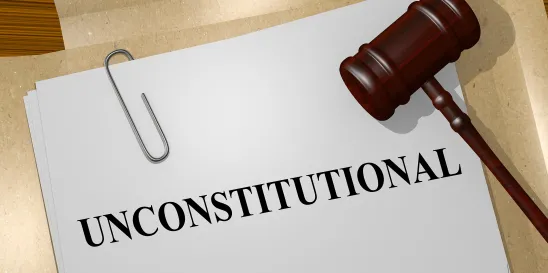| Go-To Guide: |
|
On March 1, 2024, Judge Liles C. Burke of the U.S. District Court for the Northern District of Alabama found the Corporate Transparency Act (CTA or Act) unconstitutional on the grounds that it exceeds Congress’ enumerated powers. This ruling was the result of a suit brought by the National Small Business Association, an Ohio nonprofit corporation that represents small businesses across the United States. Among other things, the district court rejected the argument that the Act was a valid exercise of authority under the Commerce Clause and Necessary and Proper Clause of the U.S. Constitution, because the Act does not regulate commercial activity on its face and applies to entities with no nexus to interstate commerce. The district court found “that ‘even if’ the CTA’s provisions were ‘necessary,’ ‘such an expansion of federal power is not a “proper” means for making those [policy goals] effective.’”
The CTA, which took effect Jan. 1, 2024, requires non-exempt U.S. entities and non-exempt foreign entities registered to do business in the United States (collectively, “Reporting Companies”) to submit beneficial ownership information (BOI) reports to a confidential database maintained by the U.S. Department of the Treasury, Financial Crimes Enforcement Network (FinCEN). BOI reports must include certain personal information about individuals who, directly or indirectly, (1) exercise substantial control over the Reporting Company or (2) own or control at least 25% of the ownership interests of the Reporting Company. According to FinCEN, this reporting requirement is intended to enhance the ability of FinCEN and other agencies to protect the U.S. financial system from illicit use, bringing the United States in line with at least 30 other countries that have implemented some form of central register of BOI.
Willful failure to comply with the reporting requirements of the Act and its implementing regulations as promulgated by FinCEN (the “BOI Reporting Rule”) could result in criminal and civil penalties, including $500 per day in civil monetary penalties and criminal penalties of a $10,000 fine, imprisonment for no more than two years, or both. According to the BOI Reporting Rule, a person is responsible for a willful violation of the reporting requirements if the person caused the failure to report or is a senior officer of the reporting entity at the time of the violation.
While the district court found the CTA unconstitutional, the ruling enjoins the U.S. Department of the Treasury and FinCEN from enforcing the CTA only against the plaintiffs, in this case the National Small Business Association, which includes over 65,000 businesses and entrepreneurs located in all 50 states. Another suit, however, seeking a nationwide injunction, was recently filed and served in the Northern District of Ohio. (See Gargasz v. Yellen, Case No: 1:23-cv-02468, filed Dec. 29, 2023).
In response to the decision, FinCEN issued a press release confirming that it will comply with the injunction and will refrain from enforcing the CTA against the plaintiffs—including members of the NSBA as of March 1, 2024. FinCEN declined to extend any relief to anyone other than the plaintiffs. The government is expected to appeal the Alabama decision. That appeal, and developments in other related cases, will be closely watched, as they may affect the legal landscape going forward. Pending further developments, however, the CTA remains in effect as to non-plaintiffs.






 />i
/>i
